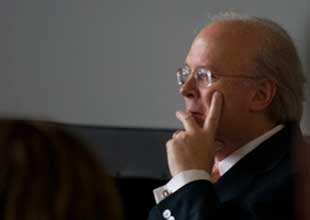Sen. John Cornyn and Rep. Pete Sessions are Republicans from Texas. So perhaps it shouldn’t be surprising that the two lawmakers—who chair the GOP’s Senate and House campaign committees, respectively—went on television this weekend to stand up for their fellow Texas Republican, former President George W. Bush. Here’s the Washington Post‘s Chris Cillizza recapping the latest Bush reputation-rehabbing offensive:
“People had jobs when Republicans were not only in charge but George Bush was there,” said National Republican Congressional Committee Chairman Pete Sessions (Texas) during an interview on NBC’s “Meet the Press”.
John Cornyn, chairman of the National Republican Senatorial Committee, told C-SPAN’s “Newsmakers” program that “Bush’s stock has gone up a lot since he left office,” adding: “I think a lot people are looking back with more fondness on President Bush’s administration, and I think history will treat him well.”
The rhetoric from Cornyn and Sessions reflects a gamble by Republicans that Bush, who left office in 2008 deeply unpopular with broad swaths of the American public, will, as almost every president does, rebound in terms of his public image as time passes.
ThinkProgress does the (easy) spadework on this ridiculousness:
Clearly, though, the American public is still sour on Bush’s record. A recent Time poll found that 71 percent blame Bush for the “balky economy,” versus 27 percent who blame President Obama. By a whopping 53-to-33 percent margin, Americans favor Obama over Bush.
As for Cornyn’s claim that “history will treat” Bush “well,” the Siena Research Institute this month released its latest poll of presidential scholars, who ranked Bush as the worst president of the modern era and in the bottom five overall.
Jon Stewart actually addressed this issue a few weeks ago, noting that Bush “really was a terrible president who ran the country into the ground”:
None of this should be surprising. Sessions and Cornyn are conservative Republicans. Conservative Republicans voted overwhelmingly for Bush in 2000 and 2004. Most conservative Republicans never thought of Bush as a bad or failed president. As late as December 2008, 72 percent of conservative Republicans still supported Bush. His overall approval rating was in the low 30s at the time. There’s probably not much strategy behind the GOPers’ comments: This is just what they really think.
When Sessions and Cornyn defend Bush, they’re simply giving Americans a preview of what the GOP campaign committees have to offer: a return to the years when the country was run by conservative Republicans. Hey, at least people will know what to expect.













